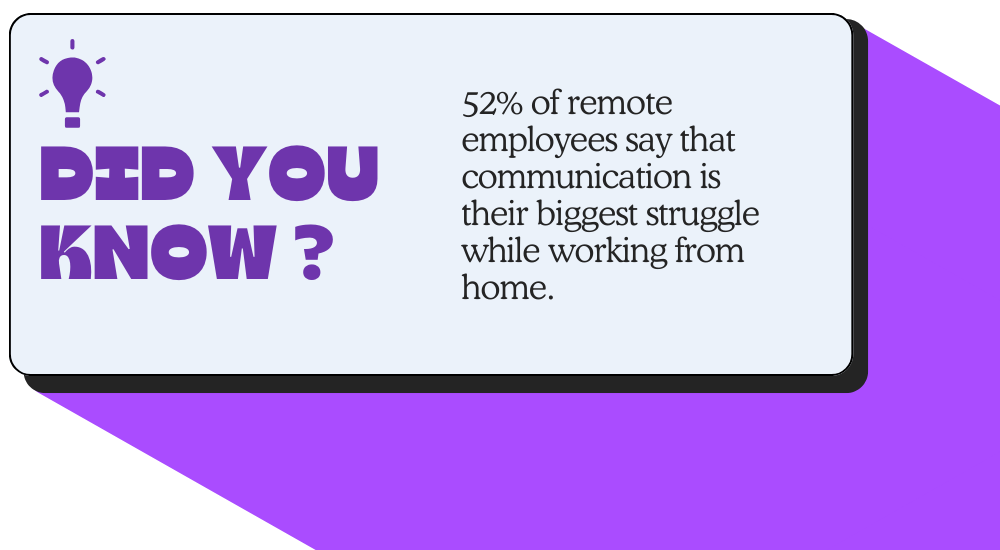Remote work keeps evolving faster than my daughter learned to say “no” to bedtime.
And if you’re an HR manager trying to hire the right talent? The struggle is real.
You’re drowning in applications from people who think “good at Zoom” counts as a remote skill. Meanwhile, the actually qualified candidates slip through because their resumes got buried under 200 others.
The skills that mattered in 2020’s emergency remote setup? Ancient history.
2025 demands a completely different playbook. One where async communication beats real-time meetings. Where documentation skills matter more than camera presence. Where self-management trumps time tracking.
I’ve analyzed thousands of remote job postings and talked to dozens of hiring managers who’ve built successful distributed teams.
Let’s see the 11 most in deman skills for remote jobs.
1. Digital Communication

Asynchronous communication skills have become the foundation of remote work success. According to Buffer’s 2024 State of Remote Work report, 52% of remote workers cite communication as their biggest challenge when working from home.
You need to master the art of context-heavy messages that anticipate questions before they’re asked. Every Slack message, Loom video, or project update should eliminate back-and-forth confusion. The best remote workers know when to hop on a quick call versus when to send a detailed written update.
Tools like Loom revolutionize async communication by letting you record quick video explanations with screen sharing. Instead of scheduling another meeting or writing a novel-length email, you can show and tell in under five minutes, giving teammates the context they need on their own schedule.
2. Self-Management Skills
Self-management in remote work means creating structure where none exists. You’re the CEO of your workday, responsible for everything from time blocking to energy management.
The remote workers who excel know their peak performance hours and protect them fiercely. They batch similar tasks together. They set boundaries between work and life even when both happen in the same space. They track their productivity patterns and adjust accordingly.
Most importantly, they communicate their working style and availability to their team. No one’s wondering where they are or what they’re working on because they’ve mastered the art of proactive updates and transparent progress sharing.
Pro tip: Block out “deep work” sessions in your calendar like they’re client meetings. Nobody needs to know you’re meeting with yourself to get actual work done. Protect those blocks like your productivity depends on it—because it does.
3. Technical Proficiency
Technical proficiency for remote work extends far beyond knowing how to unmute yourself on Zoom. The most valuable remote employees can:
- Troubleshoot their own tech issues without IT support
- Navigate multiple project management platforms simultaneously
- Set up automated workflows to reduce manual tasks
- Master keyboard shortcuts across all their tools
- Quickly adapt to new software without extensive training
You become invaluable when you can jump between Notion, Asana, Slack, and Google Workspace without missing a beat. The goal? Zero friction between you and your work, regardless of the platform.
4. Emotional Intelligence
Reading the virtual room has become a superpower in remote settings. Without body language cues and water cooler conversations, emotional intelligence fills the gaps that physical presence used to provide.
This means picking up on subtle changes in written tone, knowing when a colleague needs support even through a screen, and managing your own emotions when isolation hits. Remote workers with high EQ build stronger relationships despite the distance. They know when to add an emoji to lighten the mood and when to schedule a one-on-one check-in.
The data backs this up: companies with emotionally intelligent teams see 20% higher performance in remote settings compared to those without, according to TalentSmart’s 2024 research.
Pro tip: Create a “team mood tracker” in your notes app. Jot down when colleagues seem stressed, excited, or overwhelmed. You’ll start noticing patterns that help you time your requests, offer support, and navigate team dynamics like you’re psychic.
5. Problem-Solving
Remote work strips away the luxury of popping into someone’s office for quick help. The most successful remote employees become resourceful problem-solvers who exhaust all options before escalating issues.
They Google first, check documentation second, and experiment third. Only then do they reach out for help—and when they do, they come prepared with what they’ve already tried and specific questions about what they need. This independence makes them invaluable to distributed teams.
RescueTime helps remote workers identify productivity bottlenecks by automatically tracking time spent on different applications and websites. Instead of guessing where your day went, you get hard data on your work patterns, helping you solve your own productivity puzzles before they become performance issues.
6. Cybersecurity Awareness
Cybersecurity knowledge has shifted from “nice to have” to “absolutely essential” for remote workers. Every remote employee becomes a potential entry point for security breaches when working outside the corporate firewall.
Understanding basic security hygiene—using VPNs, recognizing phishing attempts, managing passwords properly, and securing home networks—protects both you and your company. Remote workers who take security seriously become trusted with sensitive projects and information. Those who don’t become liabilities.
The stakes keep rising as remote work expands globally, making security-conscious employees increasingly valuable to organizations navigating distributed work environments.
Pro tip: Set up a separate user account on your computer just for work. It keeps your personal browsing history, saved passwords, and downloaded files completely separate from work data. Simple separation, massive security upgrade.
7. Cultural Adaptability
Working across cultures demands more than knowing different time zones exist. The best remote workers navigate cultural differences in communication styles, work approaches, and relationship building without creating friction.
Some cultures value direct feedback while others prefer indirect suggestions. Some prioritize relationship building before business discussions; others dive straight into tasks. Understanding these nuances prevents misunderstandings that can derail projects and damage team cohesion.
Successfully adapting to diverse work styles makes you the person everyone wants on their global project team—the one who can bridge gaps and build connections across continents.
8. Project Management Skills
Project management skills have escaped the confines of official PM roles. Every remote worker now needs to manage their own mini-projects, coordinate with distributed teammates, and keep multiple balls in the air without dropping any.
This means understanding how to break down complex tasks, set realistic timelines, communicate progress, and adjust when priorities shift. You need to think in terms of dependencies, milestones, and deliverables—even if your title says nothing about project management.
The remote workers who thrive can see the bigger picture while managing the details, making them indispensable to teams trying to stay aligned across distances.
Pro tip: Start every project by writing a “reverse brief”—document what success looks like, then work backwards to map out every step needed to get there. This backwards planning catches dependencies and bottlenecks before they derail your timeline.
9. Data Literacy
Data literacy has evolved from a specialist skill to a baseline expectation. GitLab’s 2024 Remote Work Report found that 73% of remote positions now require some level of data analysis capability, regardless of department.
Modern remote workers need to pull insights from dashboards, interpret metrics, and make data-driven decisions independently. You can’t always tap someone on the shoulder to explain what the numbers mean. Understanding basic analytics, creating simple reports, and spotting trends in data makes you dangerous in the best way possible.
The ability to back up your ideas with actual data transforms you from someone with opinions to someone with evidence-based insights.
10. Creative Problem-Solving
Remote work often means making magic happen with minimal resources. No fancy office equipment, limited software access, and zero in-person brainstorming sessions. The constraints force creativity.
The most innovative remote workers see limitations as puzzles to solve rather than roadblocks to complain about. They find free tools that rival expensive software. They create systems using basic apps that outperform complex solutions. They turn their constraints into competitive advantages.
Notion exemplifies this resourcefulness perfectly—it’s an all-in-one workspace that replaces dozens of specialized tools. Remote workers use it to build custom databases, project trackers, and knowledge bases without needing IT support or expensive software licenses.
Pro tip: Keep a “constraint journal” where you document every workaround you create. That spreadsheet hack you built? The free tool combination that replaced expensive software? Document it all. These solutions become your portfolio of resourcefulness—and future teammates will worship you for sharing them.
11. Digital Wellness Management
Digital wellness management keeps you productive without burning out. You schedule regular screen breaks to prevent eye strain and remote work fatigue. You use focus apps to maintain deep work sessions. You establish rituals that separate work from personal time.
Apps like Centered help remote workers maintain focus through body doubling and flow music, while tools like Stretchly remind you to take regular movement breaks.
Remote professionals who actively manage their digital wellness report higher job satisfaction and maintain peak performance longer than those who ignore these practices.
The Takeaway
You could have all the technical expertise in the world. You could be brilliant at your core job function. But without these foundational remote skills, you’ll struggle to translate that expertise into actual impact from your home office.
The beautiful thing about this list? None of these skills require permission to develop. You can start practicing async communication today. You can download RescueTime this afternoon and finally figure out where your time actually goes. You can take a free cybersecurity course tonight.
The remote work revolution has rewritten the rules of professional value. The question now becomes: which skill will you tackle first? Your future remote self will thank you for starting somewhere. Even if that somewhere feels small today.
After years of freelancing through broken systems and vague job boards, Josie built Remployee to help others find what she couldn’t at first: flexible work that feels like freedom, not chaos. She believes real jobs should fit real lives—and that thoughtful writing can be a bridge to better work. If you’re looking for permission to choose differently, Josie’s already given it.



